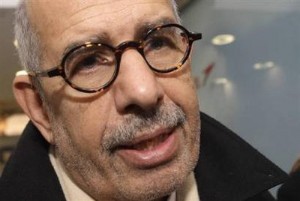
Top dissident Mohamed ElBaradei told thousands gathered at the epicentre of anti-regime protests in Cairo Sunday that they were “beginning a new era,” amid chants for President Hosni Mubarak to stand down.
ElBaradei hailed “a new Egypt in which every Egyptian lives in freedom and dignity,” his words however inaudible to most of the vast crowd gathered on Tahrir square that he addressed through a megaphone.
“We are on the right path, our strength is in our numbers,” the Nobel peace laureate said. “I ask you to be patient, change is coming.”
ElBaradei arrived at the square to address the country’s main protest for the first time to cries of “The people want to topple the president.”
“We will sacrifice our soul and our blood for the nation,” the angry crowd shouted.
The National Coalition for Change, which groups several opposition movements including the banned Muslim Brotherhood, on Sunday charged ElBaradei with negotiating with Mubarak’s embattled regime.
Six days of nationwide protests against Mubarak’s three-decade rule have shaken Egypt and left at least 125 people dead as the veteran leader clings to power. bangkok post
About ElBaradei
Mohamed Mustafa ElBaradei , born on June 17, 1942 was the Director General of the International Atomic Energy Agency (IAEA), an inter-governmental organisation under the auspices of the United Nations from December 1997 to November 2009. ElBaradei and the IAEA were jointly awarded the Nobel Peace Prize in 2005.
ElBaradei was born and raised in Cairo, Egypt. He was one of five children of Mostafa ElBaradei, an attorney who headed the Egyptian Bar Association and often found himself at odds with the regime of President Gamal Abdel Nasser.
ElBaradei earned a Bachelor’s degree in law from the University of Cairo in 1962, followed by a DEA degree in International Law at the Graduate Institute of International and Development Studies in Geneva and a PhD in International Law at the New York University School of Law in 1974.
His diplomatic career began in 1964 in the Ministry of External Affairs, where he served in the Permanent Missions of Egypt to the United Nations in New York and in Geneva, in charge of political, legal, and arms control issues. From 1974 to 1978, he was a special assistant to the Foreign Minister. In 1980, he became a senior fellow in charge of the International Law Program at the United Nations Institute for Training and Research. From 1981 to 1987, he was also an Adjunct Professor of International Law at New York University School of Law.
In 1984, ElBaradei became a senior staff member of the IAEA Secretariat, serving as the Agency’s legal adviser (1984 to 1993) and Assistant Director General for External Relations (1993 to 1997).
ElBaradei is a current member of the International Law Association and the American Society of International Law.
To his critics in the West, ElBaradeie was guilty of serious diplomatic sins… bias toward Iran, recklessness and, above all, a naive grandiosity that led him to reach far beyond his station.

Leave a Reply
You must be logged in to post a comment.